The Intel Core i7-7700K (91W) Review: The New Out-of-the-box Performance Champion
by Ian Cutress on January 3, 2017 12:02 PM ESTLegacy Tests
At AnandTech, I’ve taken somewhat of a dim view to pure synthetic tests, as they fail to be relatable. Nonetheless, our benchmark database spans to a time when that is all we had! We take a few of these tests for a pin with the latest hardware.
Cinebench R10
The R10 version of Cinebench is one of our oldest benchmarks, with data going back more than a few generations. The benchmark is similar to that of the newest R15 version, albeit with a simpler render target and a different strategy for multithreading.
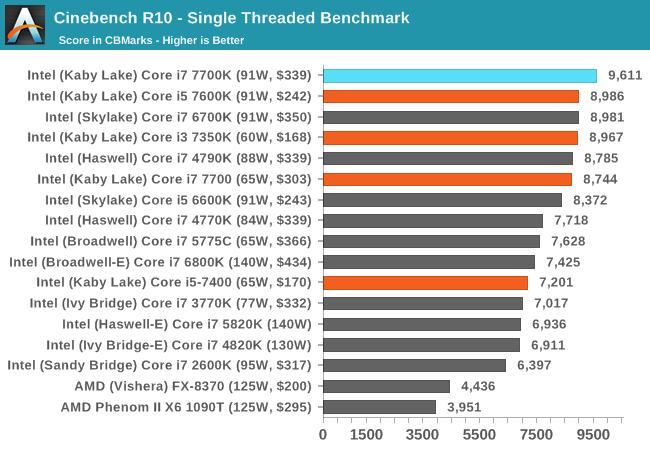
For a few years I was under the impression that CineBench’s workload was not amenable to more IPC increases, as we hovered around 7000 pts with new microarchitectures not making much of a difference. Being high frequency the i7-7700K pulls out a lead here, but it’s worth noting that Kaby Lake as a whole scores well, perhaps indicating that other features (such as frequency speed changing) can help.
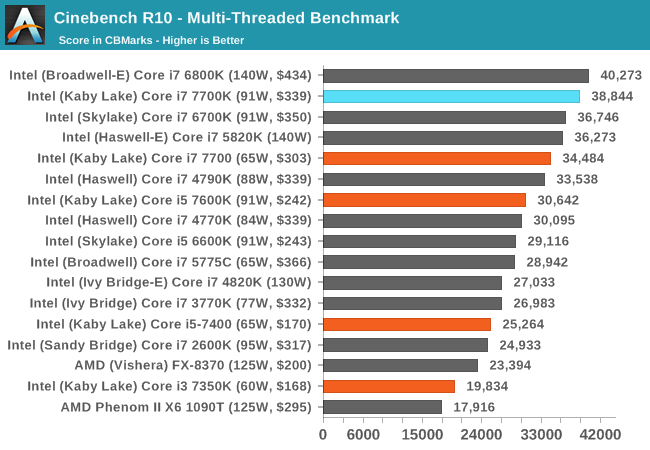
The multithreaded test gives different results, as this test typically prefers many cores. Rather than the new Cinebench tests dividing the scene up into over a hundred pieces (depends on threads), CB10 purely divides the scene into exactly how many threads are present. If a thread finishes early, it will try and cut the work of another thread in half. This sort of approach to multithreading has a different approach to frequency, cores and IPC, hence why R11.5 and R15 do bigger separations with core workloads.
Cinebench R11.5
CB11.5 has been popular for many years as a performance test, using easy to read and compare numbers that aren’t in the 1000s. We run the benchmark in an automated fashion three times in single-thread and multi-thread mode and take the average of the results.
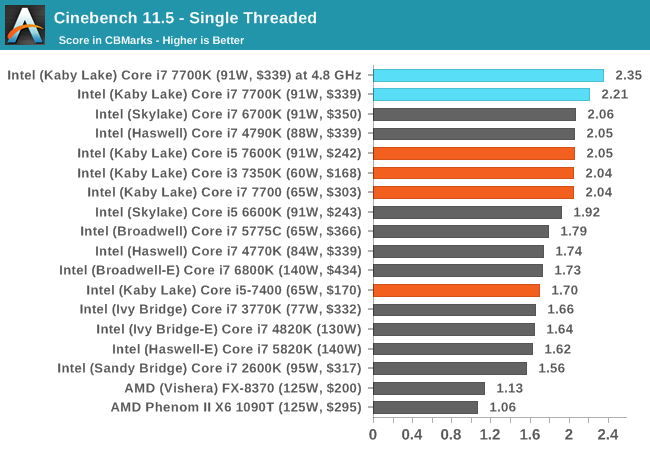
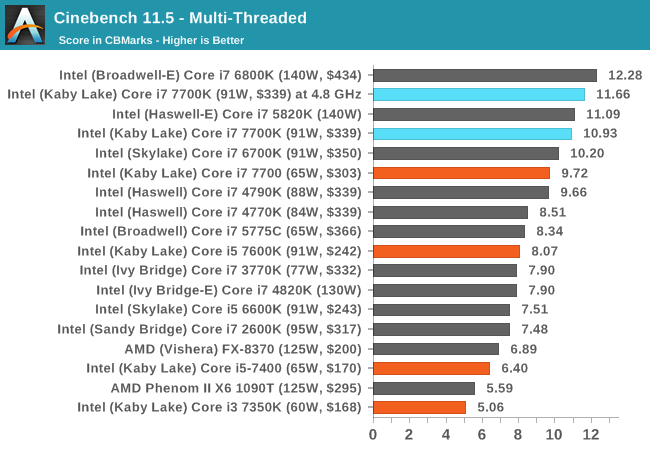
Similar to other tests, the i7-7700K takes the single thread crown, again beating an overclocked Devil’s Canyon i7-4790K, showing the out-of-the-box performance. Again, Kaby Lake as a whole seems to do well here, thanks to 4.2 GHz turbo modes on the i5-7600K and i3-7350K.
7-zip
As an open source compression/decompression tool, 7-zip is easy to test and features a built-in benchmark to measure performance. As a utility, similar to WinRAR, high thread counts, frequency and UPC typically win the day here.
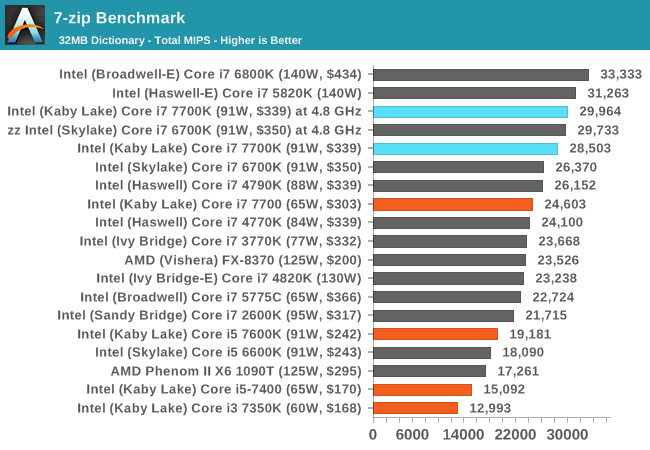
The Core i7-7700K shows the benefits of frequency over a stock i7-6700K, however at the same frequency they perform roughly the same as expected.
POV-Ray
Ray-tracing is a typical multithreaded test, with each ray being a potential thread in its own right ensuring that a workload can scale in complexity easily. This lends itself to cores, frequency and IPC: the more, the better.
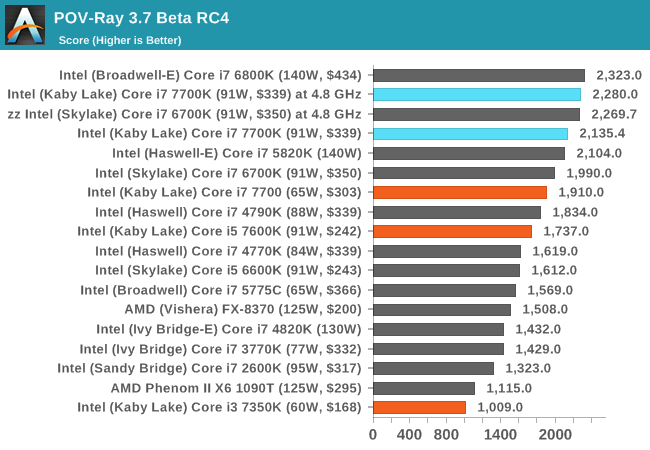
AES via TrueCrypt
Despite TrueCrypt no longer being maintained, the final version incorporates a good test to measure different encryption methodologies as well as encryption combinations. When TrueCrypt was in full swing, the introduction of AES accelerated hardware dialed the performance up a notch, however most of the processors (save the Pentiums/Celerons) now support this and get good speed. The built-in TrueCrypt test does a mass encryption on in-memory data, giving results in GB/s.
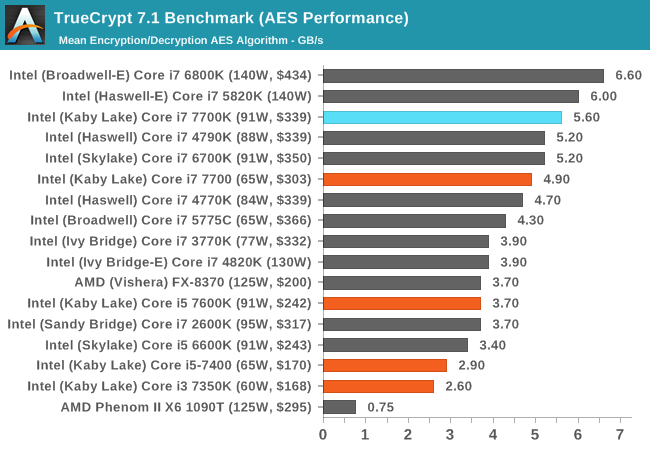
The encryption benchmark loves both threads and memory bandwidth, so we see the extreme processors pull out large leads due to 6+ cores and four memory channels. However, we see a similar picture as before to the Devil’s Canyon part: an out-of-the-box Core i7-7700K will beat an overclocked Core i7-4790K at 4.7 GHz.










125 Comments
View All Comments
ThomasS31 - Tuesday, January 3, 2017 - link
I meant difference in high end CPUs... ofc. Sorry.Why no edit on your site? :)
pxnx - Tuesday, January 3, 2017 - link
These games are ancient, why even bother benchmarking them?Michael Bay - Saturday, January 14, 2017 - link
>2015>ancient
Mithan - Tuesday, January 3, 2017 - link
I have a 2500k, and I am going to upgrade (its 6 years old).Seriously considering a i7 7700k, people keep telling me to go for Zen because I am going to see a "big difference with games", even though those same people know that Zen will run slower on a per core basis.
I don't see this "big difference" with extra cores in todays games.
We can extrapolate based on current benchmarks, that the i7 7700k will be faster for games, as seen by using the 68xx Intel Series to compare against, even in Ashes of the Singularity.
I can see a "big difference" going from Core i5 to Core i7 or Core i5 to 6/8 Cores, but I don't see a big difference going from Core i7 to 6 or 8 cores in GAMES.
I get that unzipping documents, handbreak, etc are all going to be faster, but I don't particularly care about all those apps I rarely use (if I use them). It isn't like a 7700k is going to choke on Chrome.
I get that a 6 or 8 core will let me play a game and stream content faster (I don't stream).
Can somebody else sound in on my opinion?
DigitalFreak - Tuesday, January 3, 2017 - link
From what's known about Zen so far, you are correct. If all you care about is standard PC stuff and gaming, you're better off with a Kabey Lake i5 or i7. It looks like Zen will be cheaper but similar performing alternative to the Broadwell E processors for those that do more "workstation class" stuff. Of course that remains to be seen until we get some real unbiased benchmarks.close - Wednesday, January 4, 2017 - link
Until we see some retail parts it's hard to get an good idea about Zen. Clocks may vary from ES chips and the price might be motivating enough. 5-10% less performance for 40% lower price could be appealing to anybody who's not looking only at the very highest end of every component.close - Wednesday, January 4, 2017 - link
Also if you plan on holding onto this new CPU for a long time then go for more cores even if it comes with slightly lower clocks. You'll very likely be able to overclock it and squeeze more MHz but you'll never squeeze in more cores. And remember that 6-7 years ago dual-cores were considered the norm while today some games won't even start on a dual core.Game performance is getting less and less dependent on CPU so personally I would always go for the CPU that offers better general performance and more cores than one with slightly higher clocks that focuses the performance in games and gaming benchmarks. If you want better game performance think of a better GPU, that will actually bring palpable improvement over generations.
I'd hold on to the old 2500k for a while, until we get some nice reviews for what's coming.
carticket - Wednesday, January 4, 2017 - link
Just popping in (and registering) to echo that the 2500k is still a great CPU and this is not a great time to hop on the upgrade train with such an incremental upgrade over Skylake.I had a memory failure in my system, and that got me seriously considering a Kaby Lake upgrade, but for what would likely be a $500-600 upgrade, I just don't see a significant benefit. I say this as someone who hopped on the 970 train (upgrade from a 560 Ti) a few months before the 1070s hit the market with vastly better performance.
Toss3 - Wednesday, January 4, 2017 - link
The 7700K is going to be a massive upgrade and definitely worth it if you are currently on something older than Haswell. If your software/games are running at a decent framerate, and you really don't need to upgrade, then I'd suggest waiting as we'll start seeing 6 cores becoming the standard pretty soon (first with Zen and then with Coffee Lake).close - Wednesday, January 4, 2017 - link
Aren't we talking about the exact same massive upgrade a 6700K would have provided a year ago? If that wasn't enough to convince a user to upgrade then why would it be now?Upgrading now means they've just waited one more year with a really old CPU but ended up paying the same price for the same performance this year.
And thinking about an upgrade and those massive benefits just before we finally have a hope that AMD might launch something competitive isn't the best strategy even if your framerates already suffer. For the first time in years Intel might be forced to drop prices but why wait a couple of months when you can pay full price now for last year's CPU, right?